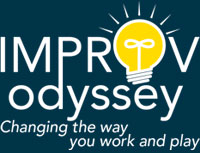Living in Our Head: Connected yet Disconnected by Technology
As individuals we are isolated from one another, full of limitations, fears, tensions, competitiveness, prejudices, and preconceived attitudes. If our openness is more than just a hope, a sentiment, a word, certain conditions must be met. The first of these we would call mutuality or trust. True playing will produce trust. – Viola Spolin – from The Teacher’s Guide Handbook, Theater Games Card File – Northwestern University Press
This is the best description of being in our heads there is. As individuals, disconnected from each other for so many different reasons in our culture, how can we not live like that?
Living in a world of delayed response through computers is becoming more and more common. And time spent like this increases steadily as the onslaught of technology gives us new ways to ‘be connected’. As workloads increase, deadlines loom and desperation drives us to succeed we get more in our heads. We are driven by the fear of negative consequences if one shirks one’s responsibilities. Of judging and being judged by others similarly isolated.
We live a large portion of our time dealing with people online, but are cut-off from direct contact with them. We organize our lives around this condition and the only respite is a trip to the water cooler, a conversation here and there with a co-worker, a trip to the movies or watching TV with a friend or family member. But what do we share with them, given the opportunity? We talk about what’s going on with us at work or in a relationship. We complain about the job, this person or that person; of how you think you’re doing relative to your job or your boss’s expectations. What you saw on TV last night, sports, etc.
Result? We reinforce our prejudices, foster our fears, increase our tension, strive to be competitive and judge others by these measures. And yes, we begin to mistrust each other and protect ourselves by being circumspect, opinionated and self-reverential. Something must change!
Sitting in front of this screen and writing these words, checking email and posting on Facebook are ways I seek contact and thus remain in my head. It’s a step removed from the joy of living by improvising and interacting in present time. I vow to make it temporary. I find ways to play with people in classes. I teach play and am a player at the same time. It gets me out of my head.
It is imperative we alter this trend by learning how to play fully and truly. We MUST gather together and PLAY!
Playing will create a community, and will foster mutual respect, develop our intuitive skills and sharpen our perceptions. It will get us out of our heads and open us up to the possibilities of having new experiences (Adventures!) and allow us to grow and be happier.
The good news is, it can happen anywhere! In your lunch room or out in the parking lot. It doesn’t take much; just a group of people who agree to be your fellow players. And you can start to form a community. Start there and make it imperative that there be a playground at work, just like at school.
More importantly, if done enough, with enough people, it will be a revolution to overthrow the creep of technology isolating each other and keeping us in our heads.


Gary, do you have any ideas for ways to play and get out of your head when you can’t engage with other people directly? Are there any solo activities?
On a walk you can use sidecoaching phrases to help you enjoy the walk more. “See the tree, now let the tree see you.” Viola used to say it can give you a direct experience. That’s a moment out of your head. Slow Motion is a way to meditate as you walk too.
If you Skype with someone, what about mirror speech?
These are just some ideas off the top of my head.
I’ll look through Viola’s book “The Lone Actor” for more and get back to you. Thanks for the comment.